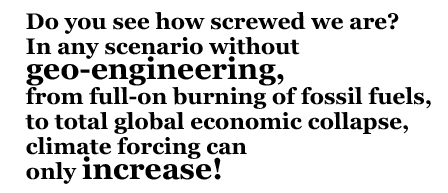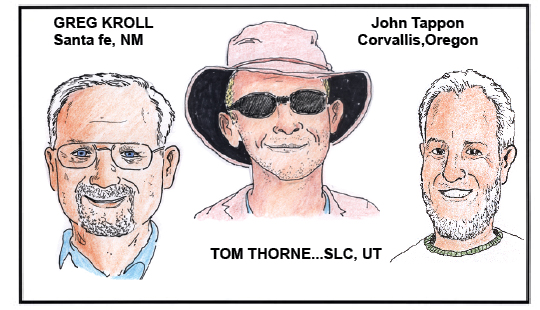Bonfire of the Vanities
by Doug Meyer
Quotations from “Inferno” by Charles Bowden
“It is not simply that I do not have clean hands. It is worse: I refuse to wash them…”
In case you hadn’t noticed, the ethic of conservation is about to be swept away by human history. Wilderness and global warming, once environmentalism’s core issues, now only reveal our self-deceptions amid the problems of balance, sustainability, and the relationship between humans and nature.
The October edition of the Zephyr brought us closer to wrapping up environmentalism’s wilderness legacy, and I’d like to add my two cents only because I think I’ve got a diagnosis for the symptoms listed there. Confusion about the definition of wilderness and our motivation for saving it, ongoing political failure, and the defenders’ desperate surrender to unlikely demographics are all evidence of a quarter century of wilderness debate, ideas still not well acknowledged in environmental circles. This is my own hyper-compressed take on an established discourse.
“Can the natural world be saved if we are not animals? Or better yet, can the natural world be saved once we utter that damning phrase of segregation: the natural world?”
“I love this nature business as we create a place in our minds and in our reserves that repudiates ourselves. We have so many reasons for this nature business and none of them are honest. Because being honest in these areas invites a messy disorder that this business is about abolishing.”
The critique proposed official wilderness as the epitome of establishment environmentalism, both putting bandaids on fundamental problems of national character and history. Once we’ve saved little bits of the wilderness, we feel better about the horror of industrial civilization. But there’s a still more alluring fiction embedded in the concept. The duality between wilderness and the society that created the wilderness produced the dream among environmentalists of constraining the USA through legal and political means. Ultimate example: the Sierra Club’s effort to persuade the American public to drain Lake Powell, which would have effectively starved the American way of life in the Southwest. Blowing up the dam with a houseboat clearly had a better chance. The voters now view environmentalists as professional liars in the same class as politicians and the media.
“Notions like the park are seen as magic kingdoms where this balance will be displayed for our edification forever and forever…The only balance that actually exists snores in the virtual reality of our nature documentaries…”
Wilderness defenders never understood that the academic attack on the wilderness idea was more importantly a devastating cultural critique. Puritanical white man wants exclusive recreation in a pristine, uninhabited landscape after committing genocide against the prior occupants of the continent. Now that’s what honest environmentalism should have been using all along to undermine the public. Instead, the professionals have their friends in Washington and their seat at the table to think about. Spending decades haplessly negotiating with a delusional nation, they’ve only succeeded in transferring the delusion onto themselves. No wonder SUWA now explores for “pretty” places to protect.
In short, it’s not that we don’t care about it anymore; instead I think we’re too embarrassed to mention the word. We’ve looked in the mirror and discovered a lot of wilderness there.
“I am out of balance. I wish for strong drink, illegal drugs and night driving with the headlights off, the tach begging for relief. I am the bad father, the hopeless husband, the insult to all peacemakers, the murderer, the menace on the midnight roads…I am adventure travel.”
Now of course I’m no climate scientist, so I welcome challenges to the next few paragraphs. These aspects of global warming science are rarely discussed in the media and thus likely have little public awareness.
First, we ought to describe more simply the one-way human impact on the planet’s carbon cycle. Centuries of global warming have been locked in by our rapid transference of carbon from long-term storage (fossil fuels) to short-term storage (plants, trees, soils, the surface ocean, and the atmosphere.) There are no realistic ways of reversing that process on any timescale meaningful to civilization. Once in short-term storage, a portion of that carbon mass will have to be cycling through the atmosphere and thus heating the planet. Therefore, all the ideas for carbon sequestration in forests and soils do nothing to address this basic problem.
Second, if a virus were to wipe out humanity tomorrow, climate forcing would roughly double within weeks due to the rapid loss of the large sulfate-aerosol reflective effect, which is emitted mostly from coal-fired power plants and automobiles. That’s right; many of civilization’s biggest CO2 sources are also emitting substances masking in the very short term much of the long-term warming of the CO2. In other words, if humanity were to somehow come together to actually decrease climate forcing, deliberate and dangerous geo-engineering of the planet’s atmosphere for a century or so would be required in addition to massive emissions reductions, assuming that already-committed feedbacks manifesting during the next several decades don’t overwhelm those efforts.
Do you see how screwed we are? In any scenario without geo-engineering, from full-on burning of fossil fuels, to total global economic collapse, climate forcing can only increase! As climate impacts worsen, driven by emissions from decades earlier, desperate nations or even perhaps extraordinarily wealthy do-gooders will be out of options. If they’re still interested, they’ll have to try the geo-engineering idea. I’m talking about the most likely form: deliberate high-altitude spraying of sulfate aerosol pollution. But they won’t be able to maintain it for the century or so needed after all emissions stop. Meanwhile, economic destruction will only slow the burning of fossil fuels. Thousand-year floods, insurance and financial collapse, famine, mass migration, regional drought, war, and finally Armageddon, that’s the future of our wondrous global economy.
“There is no way to square our plans with our numbers and no way to corral our appetites within the tidy borders of our ideals.”
So what are we to hope for, imagining at the very least a post-human Earth still viable for biological life? The spike in warming that would occur if civilization were to collapse abruptly might be surprising in its impact on the planet’s remaining species. The chain of events is just too long for science to be able to pin down what could happen.
On the other hand, even though Hansen’s Venus theory isn’t convincing yet, wouldn’t we have to guess that ending civilization now before it can burn all the fossil fuels would be the better bet for life on Earth in the long run? But then again, would it? If the Earth goes through a biological inferno where only lower order forms of life survive, who’s to say that’s not the best result? At least the Anthropocene would be over.
“[W]hat if we are not meant to walk a straight and narrow path and to separate our glass from our paper from our plastic from our metal? What if we can never really belong and the best, the very best, we can do in the empty desert on the hot summer night is to feel and to know where we would belong if we did belong, which we do not. What if we are a passing fancy in the cicada thrumming of the DNA and our only chance at life is to go at it headlong and by that act, that essential act, we guarantee the obliteration of our kind? Just a thought, but what if it is true? What if our struggles to calm ourselves and gentle ourselves are beside the point? And destroy the only thing we have to contribute to this seething skin coating the planet? And that only thing is the sure knowledge of its existence and the sure knowledge that we do not belong in this place because our hearts are too large and hungry for this ground?”
When I say the conservation ethic is finished, I’m referring to the public’s at first resigned and soon-to-be liberating awareness of McKibben’s End of Nature idea. Not only was wilderness a big lie, but global warming leaves humanity no natural way out; you cannot offer to save civilization and keep the pristine nature concept alive. (Of course Gaia still has a natural perspective: eradicate the human disease ASAP.)
Well then, don’t environmentalists at least get to point their fingers at agriculture and capitalism and maintain some semblance of the moral high ground? I no longer think so; both of those planet-killing human cultural developments now seem to have been predetermined once the human DNA strand first fell into place. And if everybody is to blame then nobody is to blame, and the environmental guilt-trip won’t work anymore.
So why do professional environmentalists still get paid? Good question, but there’s a one word answer: greenwash. Whether we’re talking about secular humanists or progressive Christians, or just plain-old terrified white America, these groups make up an enormous market that somehow still clings to the belief that we humans won’t cause our own demise, with the humanists being the most desperate consumers of that lie. Environmental orgs reaping mega-funds from the plutocracy exist primarily to serve that market.
“All of this flows through our veins regardless of our professed beliefs and all of this came not from God but from within the darkness of ourselves.”
The Christians (wouldn’t you know) have a ready-made fallback position, because their acceptance of the moral duty of individuals to exercise stewardship of God’s Creation is tempered by their expectation that the human race will inevitably fail in that trust, thus bringing on the end of the world. So I think honest environmentalism has not much left to talk about except for this. We ought to remind the faithful, a few seconds after they launch the missiles, of one little inconvenient truth: the cause of impending destruction of our environment lies not in human morality but instead is simply coded in human genetics. Oh shit! There’s no drama at the end? I guess this line of thinking has no future either.
“With luck, we will not get out of here alive.”
DOUG MEYER is the Zephyr’s Colorado Plateau Chief, except we still don’t know what that means. He lives near Flagstaff, Arizona.
To read the PDF version of this article, click HERE
Don’t forget our loyal backbone supporters!






